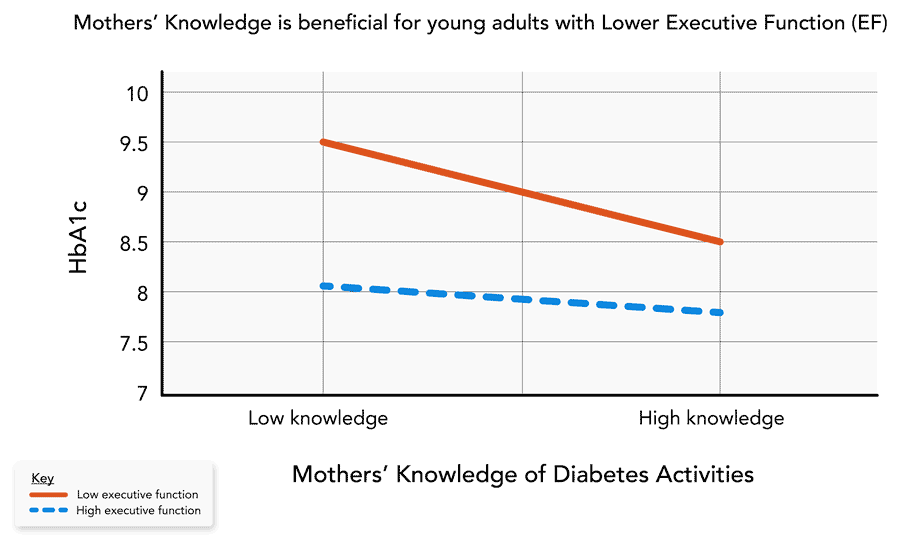How parent relationships could hold the key to managing type 1 diabetes
The transition to adulthood can be a challenging. Navigating the ups and downs of adolescence is both exhilarating and daunting, with friendships, responsibilities and pressures constantly changing as people transition from school to employment and from living with parents to independence. For young people with type 1 diabetes, these years can be especially tricky. Living with a chronic medical condition can benefit from supportive relationships, relationships that are changing during young adulthood. This period of emerging adulthood is a high-risk time for type 1 diabetes management but as yet, remains an understudied area.
Type 1 diabetes is a lifelong condition that affects 1.5 million people in the US and results in high blood glucose levels because the body cannot make insulin, a hormone produced by the pancreas. Insulin allows the body to store glucose from carbohydrates and regulates levels of sugar in the blood. The cause of type 1 diabetes – previously referred to as childhood onset, or insulin-dependent diabetes – is unknown. Untreated it can lead to eye problems, kidney failure and limb loss. Thankfully, type 1 diabetes can be managed, reducing the risk of all of these associated conditions. However, the management of the condition can be time intensive and emotionally draining, making adherence difficult.

Management of type 1
Type 1 diabetes management needs constant attention. People living with type 1 have to self-administer insulin, changing the frequency and dose of insulin dependent on recent food intake, exercise and circulating blood sugars. Blood glucose levels have to continually be monitored and carefully balanced. Missed medication can cause tiredness, thirst and the build-up of ketones (molecules that are produced by the liver when the body breaks down fat). Too much insulin can also have consequences – forgetting if you have taken a dose and injecting again can cause hypoglycaemia, which can lead to dizziness and even seizures in severe circumstances.
This period of emerging adulthood is a high-risk time for
type 1 diabetes management but as yet, remains an
understudied area.
The transition between paediatric and adult care is known to be a risky time for adherence to management regimes, yet much remains unknown about how best to support people in this age group. Constantly adhering to self-management behaviours can create distress for adolescents and adults and be difficult t o manage alongside transitions such as leaving the family home, going to college, and navigating new social circles. Prof Cynthia Berg, Distinguished Professor of Developmental Psychology and Health Psychology at the University of Utah, has spent many years studying how young people live with long-term health conditions, bridging the knowledge gap between adolescent and adult research.

The social network
The changing nature of relationships in adolescence is profound as children move towards friendships and are less influenced by parental input. Prof Cynthia Berg studies how family and friendships can influence adolescent management of chronic illness such as cancers and diabetes. Together with colleagues, she is interested in how young people manage their social context, examining how parents and friends can help or hinder diabetes management during this fluctuating time.
In 2011 Prof Berg embarked on the NIH-funded READY study (REgulating Adherence to Diabetes as Young adults) together with Prof Deborah Wiebe to focus on emerging adulthood. The research programme – a long-term observational study at two sites – recruited 250 students in their senior year of high school and followed them up for four years. The findings shed light not only on the role of relationships, but crucially, point to family issues that could be targets for intervention.

Parental involvement
Across adolescence, parents’ knowledge about their child’s activities around diabetes typically declines. The READY results reveal that higher levels of parental involvement in diabetes management, measured by levels of disclosure, acceptance, and knowledge of activities, is linked to better values of blood glucose compared with families with lower levels of parent involvement. Furthermore, children whose parental involvement was higher in a particular year did better than in years when their parental involvement was lower. The findings suggest that a strong foundation of good relationships with parents supports health outcomes. This was especially true for young people who had lower levels of what is referred to as executive function, an aspect of cognition that refers to our ability to plan, switch attention and multitask.
Family conflict was linked to lower adherence to management and higher values of glucose level, especially where parents report
low self-control.
Staying on top of one’s daily self-care requires a high degree of executive function. The READY study shows that those with higher levels of executive function fare better in terms of their blood sugar levels over the course of time, reducing the risk of complications later in life. High-quality involvement of parents was shown to act as a buffer to lapses in management for those with lower executive function. Identifying those with lower executive function could make it easier for health professionals to spot those who need greatest support.

Towards interventions
One aspect of family life, namely conflict over diabetes management, has also been examined in their lab. The analysis led by MaryJane Simms Campbell, a clinical psychology doctoral student at the University of Utah, shows that while family conflict was linked to lower adherence to management and higher values of glucose level, this association was reduced when parents reported higher self-control. These findings support the idea that parents who are more involved and self-controlled can improve their child’s diabetes management. Addressing conflict and self-control through psychological therapies can have a positive impact on health.
Paediatric health messaging often emphasises the importance of establishing autonomy during adolescence. However, these findings underline how crucial parental involvement is in diabetes management as their child navigates this changing time. Prof Berg and her colleagues point out in a recent paper in the Journal of Paediatric Psychology that this could be facilitated by technology, for example, by sharing glucose monitoring data to increase parental knowledge. In contrast to the emphasis on independence, the READY research shows that connections with parents remain vital during this risky period, particularly for those with lower executive function.
Looking forward
The findings of the READY study provide a wealth of insight into how family relationships affect type 1 diabetes management for emerging adults, underlining the importance of parental involvement. Furthermore, they are developing interventions that can support young adults through text messaging and improving supports from romantic partners, friends, and family during this tricky transition phase. As incidence rates continue to rise, more and more young people will be affected by the burden of living with this condition, and the quest to find new approaches to help is pressing.

Personal Response
What sparked your interest in young people’s diabetes management?
<> Cynthia Berg: I was intrigued by how families solve difficult everyday problems, and type 1 diabetes requires that families regularly solve daily problems with highs and lows in their blood sugars and other daily challenges in management.
MaryJane Simms Campbell: I am especially interested in how families adapt to and cope with childhood chronic illnesses. Given the daily challenges associated with managing type 1 diabetes, understanding the psychosocial impact of the condition for the child and their family is particularly important.
What could such a family intervention look like?
<> As families are still important during emerging adulthood, interventions that keep parents involved in an autonomy supportive manner and broaden the support young adults receive to romantic partners and friends will be important. Further, as family conflict is a normal aspect of adolescence and can, under certain conditions, be productive for adolescent development, family interventions that promote working through conflict will be helpful. For example, interventions that teach families strategies to more effectively handle conflict when it arises may be especially beneficial for teens with type 1 diabetes (e.g. managing emotions, problem-solving skills, and conflict resolution techniques).